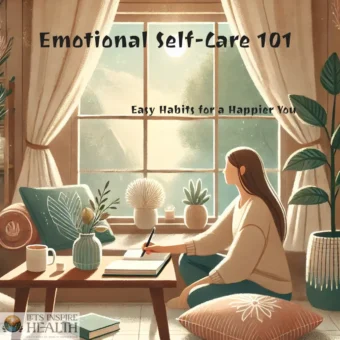Life can often feel like a whirlwind of responsibilities, deadlines, and demands that leave us feeling overwhelmed. Amid this, nurturing your soul and developing emotional strength are essential to finding balance, peace, and a sense of purpose. These practices enrich our lives, helping us cultivate resilience, kindness, and a deep understanding of ourselves and others.
Whether you’re seeking inner peace, greater self-awareness, or the ability to weather life’s challenges with a calm heart, these practices provide a path toward emotional well-being and strength. Embracing soulful habits helps us feel grounded and connected, no matter how chaotic the world becomes.
1. Understanding the Importance of Soul Nourishment
Nourishing the soul is about attending to our innermost needs and desires, cultivating practices that bring joy, peace, and purpose. When we nourish our souls, we invite positivity, strength, and resilience into our lives, allowing us to cope with life’s inevitable challenges. Soul nourishment also fosters a deeper connection with ourselves, aligning our lives with our core values and guiding us toward personal growth.
Practices that nourish the soul are diverse, from spending time in nature to embracing creativity and self-expression. They are unique to each individual and resonate with what brings a sense of joy and purpose. Finding practices that connect with your spirit can empower you, transforming how you approach each day with renewed vitality and peace.
2. How Emotional Strength Fuels Growth and Resilience
Emotional strength is the foundation that enables us to navigate life’s ups and downs with grace. It allows us to process emotions constructively, recover from adversity, and stay grounded during challenging times. Developing emotional strength not only improves our mental health but also deepens our capacity for empathy, understanding, and self-compassion.
Emotionally resilient individuals tend to approach challenges as opportunities for growth rather than as setbacks. By building emotional strength, we learn to respond to difficulties in ways that nurture and protect our mental and emotional health, ultimately supporting a balanced and fulfilling life.
3. Practices to Nourish Your Soul
Nourishing your soul involves simple but intentional practices that provide space for reflection, joy, and renewal. Here are some meaningful practices that can enrich your daily life and strengthen your emotional well-being.
Cultivate Gratitude Daily
Gratitude is a powerful practice that shifts our focus from what we lack to what we have. By recognizing and appreciating even the smallest blessings, we can cultivate a more positive outlook on life.
- How to Practice: Begin a daily gratitude journal, writing down three things you’re thankful for each day. This habit brings greater awareness to the beauty and abundance already present in your life.
- Benefits: Enhances mood, reduces stress, and strengthens connections with others.
Embrace Mindfulness Meditation
Mindfulness meditation brings our attention to the present moment without judgment. It’s a practice that encourages self-awareness, reduces stress, and fosters a deep sense of inner calm.
- How to Practice: Dedicate 5-10 minutes each day to sit quietly, focusing on your breath and observing any thoughts or emotions that arise without attachment.
- Benefits: Reduces anxiety, improves emotional regulation, and increases mental clarity.
Engage in Self-Reflection and Journaling
Self-reflection provides an opportunity to gain insight into your thoughts, emotions, and behaviors. Journaling is an effective tool for exploring these reflections, giving you a safe space to express yourself without fear of judgment.
- How to Practice: Spend a few minutes each evening journaling about your day, your emotions, or any significant experiences. Ask yourself reflective questions, like “What did I learn today?” or “What can I let go of to find peace?”
- Benefits: Boosts self-awareness, fosters personal growth, and enhances emotional understanding.
Connect with Nature
Spending time in nature reconnects us with the world around us, grounding us and bringing a sense of peace. Nature has a calming effect on the mind and body, reducing stress and helping us feel refreshed.
- How to Practice: Take a walk in a nearby park, spend time gardening, or simply sit outdoors to observe the natural beauty around you.
- Benefits: Lowers stress, improves mood, and fosters a sense of belonging.
Create a Sacred Space
A sacred space is a personal area dedicated to peace and reflection. This space can be a corner in your home filled with items that bring you joy, such as candles, plants, or favorite books.
- How to Practice: Designate a small area in your home as your sacred space. Use it daily to meditate, journal, or simply enjoy a moment of silence.
- Benefits: Provides a calming environment, encourages mindfulness, and promotes relaxation.
Practice Kindness and Compassion
Acts of kindness, whether toward ourselves or others, can profoundly impact our emotional well-being. Compassion strengthens our connection with others and reminds us of the shared human experience.
- How to Practice: Perform small acts of kindness each day, such as complimenting a friend or helping a neighbor. Also, practice self-kindness by treating yourself with the same compassion you would offer others.
- Benefits: Boosts happiness, reduces stress, and fosters positive relationships.
4. Building Emotional Strength: Techniques and Habits
In addition to nurturing your soul, building emotional strength is essential for maintaining balance and resilience. Here are practices that cultivate inner strength, enabling you to cope with adversity while staying grounded and hopeful.
Develop a Growth Mindset
A growth mindset empowers us to view challenges as opportunities for learning and growth rather than as obstacles. By embracing this mindset, we open ourselves to new possibilities and resilience.
- How to Practice: Reflect on past challenges and identify lessons learned. Remind yourself that mistakes are part of the learning process and essential for growth.
- Benefits: Increases resilience, encourages adaptability, and promotes a positive outlook.
Practice Self-Compassion
Self-compassion involves treating yourself with kindness and understanding, especially during moments of difficulty. This practice encourages emotional healing and reduces self-criticism.
- How to Practice: When faced with a setback, speak to yourself as you would a friend. Replace self-critical thoughts with gentle affirmations, such as “I am doing my best.”
- Benefits: Reduces negative self-talk, improves emotional resilience, and fosters self-acceptance.
Engage in Physical Activities that Bring Joy
Physical activity not only supports physical health but also enhances emotional well-being. Activities like dancing, yoga, or hiking can elevate your mood, release stress, and foster a sense of accomplishment.
- How to Practice: Find a physical activity that you enjoy and commit to it regularly. Whether it’s a morning walk or a weekend hike, make movement a joyful part of your routine.
- Benefits: Boosts mood, reduces anxiety, and enhances energy levels.
Set Healthy Boundaries
Boundaries are essential for protecting our emotional health and maintaining balance in our relationships. They allow us to prioritize our needs without guilt, fostering respect and understanding.
- How to Practice: Identify areas where you need boundaries, such as work-life balance or personal time. Communicate your boundaries clearly and assertively to others.
- Benefits: Reduces stress, strengthens relationships, and promotes self-respect.
Surround Yourself with Positive Influences
The people we spend time with can have a significant impact on our emotional well-being. Positive relationships provide support, encouragement, and joy, all of which nurture our emotional health.
- How to Practice: Evaluate your relationships and spend time with those who uplift and inspire you. Seek out communities or groups that align with your values.
- Benefits: Increases happiness, fosters a sense of belonging, and promotes emotional stability.
5. How to Create Lasting Habits for Emotional and Soulful Health
Creating lasting habits for emotional and soulful health requires consistency, patience, and a gentle approach. Here are some tips to help you integrate these practices into your daily life:
- Start Small: Begin with one practice at a time, gradually adding others as they become part of your routine.
- Set Intentions: Instead of rigid goals, set intentions that reflect your values and aspirations. For instance, “I will practice gratitude daily to foster positivity.”
- Practice Self-Compassion: Allow yourself room for growth, and avoid self-criticism if you miss a day. Remind yourself that each day is an opportunity to begin anew.
- Celebrate Progress: Recognize and celebrate the positive changes in your emotional well-being. This encourages consistency and motivates you to continue.
6. Conclusion: Embrace the Journey to Emotional Resilience
Building emotional strength and nourishing your soul is a transformative journey, one that leads to a deeper connection with yourself and the world around you. By embracing these practices with an open heart and a gentle spirit, you empower yourself to face life’s challenges with resilience, compassion, and joy.
The journey to emotional resilience and soulful nourishment is lifelong, offering countless opportunities for growth, healing, and discovery. Embrace each step, celebrate your progress, and remember that every effort you make toward nurturing your soul brings you closer to a life of peace, balance, and fulfillment.







